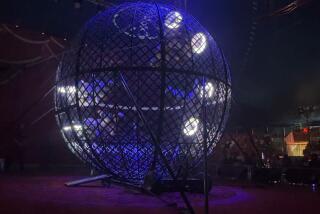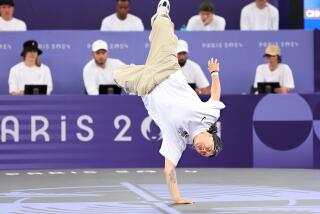The Human Spirit Works Without a Net
Rarely can life appear more invincible than in a spectacle, which is one of the reasons we love the ones with happy endings.
The event in question was a performance of Cirque du Soleil, the French-Canadian troupe (which returns to Costa Mesa in January) with a well-deserved reputation for combining dazzling feats with a vaudevillian sense of humor. We had the good fortune to be seated in the first row, which provides a nice micro-view, though does tend to produce a stiff neck.
The music started, a bunch of stilted giants began lumbering around the tent with a kind of hypnotizing languor, and as usual, my mind began to wander. Bush, Clinton, or Raw Sparrow? Will the new ground cover take on my hillside? Is this Lauder for Men I’m marinating in a little too much? How long does it take them to put up this tent?
My wife, eyes riveted and neck craned, sat beside me and smiled. She was confined to a wheelchair at the time, and as the giants loomed above us and the music played and, later, the gymnasts and contortionists performed impossible movements, it became startlingly, if unspokenly, clear how much my wife could no longer do.
She was always better than I at enjoying simple pleasures, having that enviable ability to, as Jackson Browne once sang, “forget about the losses and exaggerate the wins.” It was a spectacle we had paid for, and a spectacle she was there to enjoy.
The Cirque du Soleil ultrastud (I forget his name, but he did a spread in Esquire not long ago) took to the ropes and proceeded to execute a long series of mind-boggling antics mid-air, a study in strength, grace, bravery. I wondered how long I would have to work out to look like him, but ran out of centuries. My wife could only grin at this superhuman male twisting through the sky with such a masterful insouciance. What would it feel like to do that?
“God, he’s beautiful,” she said.
“Gee, he really is,” I admitted.
“Don’t feel bad, he probably can’t write,” she noted, always protective.
“Probably can’t even spell his name!” I enthused.
“I wouldn’t bet on that.”
A half hour or so into the show, I noticed a girl who was part of the trapeze team. What struck me about her was that she wasn’t old enough to have shed her youthful chubbiness but was still strong enough to hurl her body through the air. She hurled it not with the greatest of ease, but rather with a mortal effort and concentration that revealed her precariousness and danger. The other trapeze artists were older, more sinewy sorts, with years of experience etched into their muscles and into the bold masks of invincibility they had taught themselves to wear. This girl, though, the young one, seemed to be reaching for her maturity with each lunge toward the bar, as if trying to bridge the distance from girlhood to womanhood in that trembling instant her feet sprang from the platform and her fingers locked onto the onrushing trapeze.
I was mesmerized. I watched the girl streak across the sky, untethered, only to clutch salvation when it seemed so sorely out of reach. She arched from one high platform to another like a bird, on invisible wings. She spun impossibly in the hushed altitude of the tent, stretched her girlish arms, claimed both velocity and safety in a long glide to a lower stand. She was gaining confidence. Her strength was focusing, her skills solidifying. Yes, there she was, pivoting from innocence to experience before our very eyes, airborne a hundred feet above the nets, in direct competition with gravity, in flagrant disregard of death.
“I can’t believe that girl,” I said.
“I can’t take my eyes off her,” said my wife.
I couldn’t either. She was youth, beauty, motion, courage, skill--so much of what is good in life, condensed into a single visible unit.
Then she fell.
At first it looked staged, so casual was her beginning. But descent was astonishingly rapid. One had the inescapable sense--similar to watching the motorcade speed away from Dealey Plaza--of terrible events unfolding.
She missed the net.
The report of her body hitting the arena floor was neither resonant nor long, rather an abrupt thud all but smothered by the festive hum of the crowd and the baritone chorus of “ohhs” that accompanied her fall. What I remember best is a sense of heaviness, of aural weight, of distinctly human impact.
Two things happened then: The crowd went silent, but the show went on.
The girl struggled up, finished the floor routine with the rest of the troupe, then bounced backstage with a notable lack of rhythm. She wasn’t with them when they came back out, and she didn’t show up the rest of the night, not even for the final bows and cheers.
If the crowd missed her as much as I did, it didn’t let on. The performance was a success. But I sat numbed and somehow resentful that human frailty had been allowed even so brief an appearance in this passionate ritual of danger, precision and nonchalance. The illusion had been scratched, and I couldn’t take my mind off this girl’s fall, the slap of her body on the floor, or the embattled pride with which she made her exit.
Afterward, I asked the usher if she was OK.
“She’ll be fine,” he said. “It’s happened before.”
I called the circus publicity office a few days later to see how she was doing. They told me she was fine. Nothing broken. They told me she had fallen before, had surgeries to help heal the damage and would be back in the show when she was strong enough. It was part of any circus performer’s life.
I felt better after this phone call, though I can’t say specifically why. Maybe it was because publicity didn’t sound too worried about her. No. You can hear that same tone of voice from an oncologist, or the IRS.
Maybe it was because I realized that this girl had succeeded brilliantly at what she’d set out to do. What I remembered most clearly was her proud exit from the stage. She’d shown me, without uttering one word, that while death always wins, the human spirit can fly--and fall, too--with dignity, straight into the face of it.
More to Read
The biggest entertainment stories
Get our big stories about Hollywood, film, television, music, arts, culture and more right in your inbox as soon as they publish.
You may occasionally receive promotional content from the Los Angeles Times.










